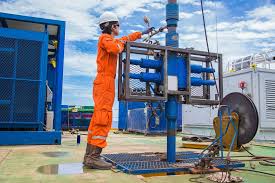LEARNING
OBJECTIVES
Well
completion is the process that changes a drilled well into a delivering one.
These steps include casing, perforating, gravel packing, and installing a
production tree. The objective of this training is to provide participants with
a comprehensive understanding of well completion process. It familiarizes with
the main completion components for naturally flowing wells: reservoir-wellbore
interface, the completion string and the production wellhead. It will enable
attendees to know about the downhole and surface completion accessories needed
to optimize production and for future well operations. Intelligent completions
are also explained.
PRE-REQUISITES
Graduates or
engineers with experience, engaged in drilling operations, production operations,
workover, and completions; petroleum engineering in both the service and operating
sectors.
RESOURCES
· Live lectures from experienced
professionals
· Recorded session
· Digital manuals
· Field case studies
· Certificate of Completion
TOPICS
TO BE COVERED
· Introductions
Ø Fundamentals of Well completion
Ø Procedure and Operations
Ø Components
· Introduction to Down Hole Equipment
Ø Identify the functionality
Ø Recognize the full suite of equipment
· Wellhead and Christmas Tree
Ø Difference between wellheads and
Christmas trees
Ø Describe the functions of a wellhead
Ø Identifying the various annuli and
various seals
Ø Function of a Christmas tree
Ø Identify the various valves and their
functions
· API Standards
Ø Identifications
Ø Differences between API connections
and premium connections
· Packers
Ø Function of a packer
Ø Packer setting methods
Ø Mechanical components of packers
Ø Method of categorizing packers
Ø Main options for connecting the
tubing to the packer
· Tubing
Ø Description and connection selection
criteria
Ø Physical basis for tubing length
changes
Ø Calculate a simple tubing length
change
Ø Characteristics of a tubing string,
including weight/internal
Ø Results from a torque/turn chart
Ø Metallurgy, and associated properties
· Safety Valves
Ø Components of a landing nipple
Ø Lock mandrel system
Ø Function of a safety valve
Ø A surface controlled and a subsurface
controlled valve
Ø Conditions where a safety valve
should be placed
· Accessories
Ø Wireline re-entry guides
Ø Blast joints
Ø Flow couplings
Ø Incorporating equipment
· Well Data
Ø Identify areas requiring review
Ø Reservoir data
Ø Fluid data
Ø Results from a torque/turn chart
FAQS
Who is
this course for?
Graduates
or engineers with experience, engaged in drilling operations, production
operations, workover, and completions; petroleum engineering in both the
service and operating sectors.
Is
previous experience required?
You do
not need prior knowledge or experience to complete this course and it is
assumed that you are competent in your designated role
How will
this course benefit me?
This
course aims to provide an overview of coiled tubing equipment and its operation
How will
this course benefit my company?
To ensure
you have an overview of Completion equipment and its operation.
What
standards are referred to in this course?
This
course is made according to industry best practice
Is there
an assessment?
Once you
have completed the course, you will be asked a series of questions to check
your knowledge and understanding


